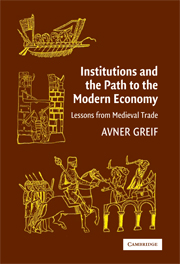Book contents
- Frontmatter
- Contents
- Abbreviations
- Preface
- I Preliminaries
- II Institutions as Systems in Equilibria
- III Institutional Dynamics as a Historical Process
- IV The Empirical Method of Comparative and Historical Institutional Analysis
- V Concluding Comments
- Appendixes
- References
- Index
- POLITICAL ECONOMY OF INSTITUTIONS AND DECISIONS
IV - The Empirical Method of Comparative and Historical Institutional Analysis
Published online by Cambridge University Press: 05 September 2012
- Frontmatter
- Contents
- Abbreviations
- Preface
- I Preliminaries
- II Institutions as Systems in Equilibria
- III Institutional Dynamics as a Historical Process
- IV The Empirical Method of Comparative and Historical Institutional Analysis
- V Concluding Comments
- Appendixes
- References
- Index
- POLITICAL ECONOMY OF INSTITUTIONS AND DECISIONS
Summary
The inherent indeterminacy and context-specificity of institutions challenge our ability to study them using the traditional social science empirical methods. These methods rest on the premise that, given a set of exogenous and observable features of a situation, deductive theory can sufficiently restrict the outcome set to render a positive analysis meaningful. In the case of endogenous institutions, we lack such a theory.
Parts I–III highlight several reasons why it may be impossible to develop a deductive theory of institutions. Institutions are inherently indeterminate and context-specific. Various transactions can be linked to a central one, and multiple equilibria – and hence institutions – can prevail in the repeated situations that are essential to institutional analysis. Different institutions embodying distinct cognitive models and information can be self-enforcing. Institutional change is a function of the prevailing institutions, while its direction is influenced by institutional elements inherited from the past. Whether or not a deductive theory of institutions will ever be developed, our current state of knowledge is such that we cannot understand institutions relevant in a particular time and place by relying solely on deductive theory.
Inductive analysis à la Bacon, which identifies and classifies institutions based on their observable features alone, is similarly deficient for studying institutions. Pure induction is insufficient because various institutional elements, such as beliefs and norms that motivate behavior, are not directly observable.
- Type
- Chapter
- Information
- Institutions and the Path to the Modern EconomyLessons from Medieval Trade, pp. 305 - 308Publisher: Cambridge University PressPrint publication year: 2006



